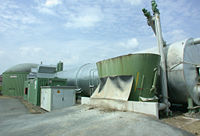
Photo from wikipedia
Poultry waste is increasingly used as a substrate for the methane fermentation process in a biogas plant. However, not all waste materials processed in the meat industry meet the criteria… Click to show full abstract
Poultry waste is increasingly used as a substrate for the methane fermentation process in a biogas plant. However, not all waste materials processed in the meat industry meet the criteria for optimal process management and cost-effective methane efficiency. An example may be centrifuged biological sludge, etc. Treatment of such material used as a substrate by introducing new metabolically and enzymatically active strains of bacteria could be beneficial for the fermentation process in a biogas plant and provide increased energy efficiency. The aim of the study was to compare the amount and quality of biogas obtained from biological sludge from the processing of poultry vaccinated with metabolically diversified bacterial inoculum after initial incubation of the batch before the actual process in a biofermenter. Laboratory tests were carried out in accordance with the guidelines contained in the DIN 38 414-S8 and VDI 4630 standards. Based on the obtained results, it was found that the optimized biological sludge can be used as a substrate in the methane fermentation process in a biogas plant. The material processed by the combination of bacterial strains marked with the symbols A/C, E/G, and F/H showed a significantly increased efficiency of biogas, including methane, compared to the non-grafted material. This is a good predictor for industrial applications, process feasibility, economic viability, and environmental sustainability that should be compiled based on the results obtained from this study.
Journal Title: Energies
Year Published: 2021
Link to full text (if available)
Share on Social Media: Sign Up to like & get
recommendations!